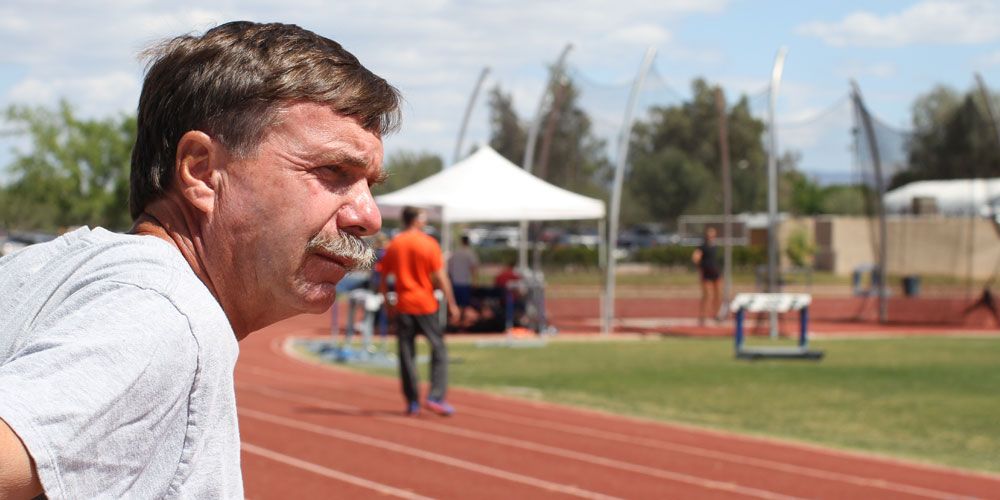
If you ask anyone in track and field to name the top coaches in their sport, the name Dan Pfaff will likely crop up. Currently director of education and head jumps coach at Altis, Dan has coached 49 Olympians including nine medalists, 51 World Championship competitors (also nine medalists), and five world-record holders, as well as many national and collegiate champions. In this post, Dan shares insights on mindset gleaned from 44 years of experience.
Mental resilience is a skill I’ve heard you speak about before. How important is it?
I think the higher you get in sports, probably the more critical mental resilience skills become. Before then, most of the big rocks are pretty obvious. But as you get to national class and international class, icebergs get more numerous, and the landmines get trickier. So mental resilience training has always been a big part of what I do as a coach.
What are some mindset challenges you feel like athletes today struggle with maybe more so than they ever have? Or in different ways than they did maybe a generation ago?
Well, I don't think the landscape is that different from decades ago. There's probably more complexity or bias in certain encounters, but I think self-talk is a big one, especially at the elite level, and people don't realize that. It could be ruminating thoughts or consistent themes that keep coming up. This why we use journaling a lot. We ask athletes to review their day and write down what they were thinking when they woke up. What about when they were making breakfast, in the shower, or driving to practice? How about during practice? What are some things that kept coming up?
We want to know what they say to themselves when training or a competition has gone well and compare that to how they talk when they’re struggling or in a slump. What goes through your head during and after that nightmare situation? What shifted not only during the process but in the days leading up to the event? I think if you don’t know what’s truly going on inside an athlete’s head, you’re just guessing.
Among the high-performing athletes you've worked with, what are some commonalities when they've got their A-game mentally?
The really great ones are usually calculated risk-takers. So they're pretty good at assessing the environment, and they know when to take a risk and when to tread water, whether it's during the season or in a competition-specific venue. So I think risk-taking is probably the common denominator among people who get on the podium. Because there are moments – no matter how fast your event is – in which you’ve got to make a decision.
You have to walk in there with a strategy or some tactics. And then that's going to be tested during the competition. And your confidence in that strategy and those tactics and your experience in executing it are paramount for podium-level success. I think it's a mistake to go into a big competition with some new strategy and pull it off. In my experience, these people have rehearsed strategies and tactics during a series of lead-up competitions and perhaps in years of training.
So it’s really a case of planning and then leaving room for a little magic to happen?
A lot of athletes enjoy their comfort zones. So they get to a certain level, and they start competing just to stay at that level instead of taking a chance. There are a lot of people in Olympic finals who are happy to be there and like the rewards and the accolades that come out of making a final. Whereas the people who get on the podium can escape that comfort zone and take some calculated risks to get a medal. I see a trend, especially in our sport and track and field, of people protecting their comfort zone rather than exploring the outer edges of their ability or potential.
What are some ways you encourage that kind of growth mindset to help athletes break out of their comfort zones?
Well, I think risk-taking is a layered process. And the first touchstone is that failure is not a negative, it's a springboard into a new chapter or a new venue of exploration. Failure is really guardrails for us rather than a showstopper. So the first step is how do we coach dealing with failure. The second is a systematic implementation of risk-taking opportunities and strategic testing of tactics.
Unfortunately, with the evolution of our sport, kids get on the Diamond League circuit and they don't have these build-up meets where they can experiment with things. In a university setting, there are always low-key meets where they can take chances and be more open to risk-taking, because they know that they’re so far ahead of the field that if something doesn’t work, they can salvage the effort and still win or look respectable. But if your whole calendar is Diamond League meets, it’s pretty hard to do that, because you’re fighting just to stay on the circuit and preserve your spot.
Get a Pro-Level Mindset
Want to learn more about risk-taking, mental resilience, self-talk, and the other skills mentioned in this conversation? Then download the Champion’s Mind app for your iPhone or Android device.
If you’re a coach, your team will benefit from our 12-module course. Learn more about it here.

